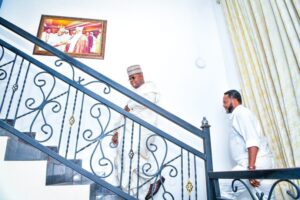_By Fanisi Babatunde

Theories of leadership in any period are driven by a set of convictions and hopes on the part of the theorist. One conviction is that rapid societal evolution makes it imperative to keep one’s pulse on social changes and their implications for how groups of human beings can best be led, an inherent assumption in the writings of leadership theorist Rosabeth Moss Kanter and numerous other scholars.
Also,a core Western assumption about leadership is that leaders who succeed have “vision,” a tangible end goal toward which they and their followers can strive, part of the assumptions are also that leaders who aspires to carve an indelible traces of thier legacies and achievements runs a charismatic and participative approach to leadership both in ideology and in practice.
Historically, Kogi State has never practiced a governance style where a new crop of generational leaders are developed until the coming of the youthful Executive Governor of Kogi State, Alhaji Yahaya Adoza Bello who alongside governing the state have groomed models for future governance responsibilities.
A critical analysis of the major shortfalls in leadership and governance is the inability of modern day leaders to breed new crop of leaders that will sustain and carry on an array of legacies on a developmental path. Topmost Amongst leaders that have been fully developed in Kogi State is the current deputy Governor of the State, Chief Edward Onoja who didn’t only learn the ropes while in Government but have been part of the political developmental path of the New Direction Government. An experienced strategist who teamed up with someone described as his Siamese twin in breaking age long barriers of “Almost Total Exclusion” of the youth constituency from governance, walked an infamous and divine path to victory and stood firmly through thick turbulence till the government was stabilized amidst a hand full of court cases and election related litigations.
Chief Edward Onoja being a visionary leader like his boss the governor of the state marketed and attracted many crop of politicians we have today in Kogi State ranging from Local government councillors to LGA Chairmen to State Assembly members to so many state top government functionaries and National Assembly members. Many of whom had hitherto contested elections in the past under those who saw no reasons why youths have to participate in governance.
While the governor was busy pursuing his presidential ambition, governance was running at 100% optimum capacity with projects flooding the state at a neck breaking speed and key government functions taking place as usual. This to me can only be achieved under an atmosphere where capacity have over time been developed amongst key lieutenants in the system.
Listening to the aura of confidence that sorrounds the executive governor of the state each time he is asked on the sustainability of his legacies, he is quick to always assert how much he has breed a lot of capable hands to take over from where he stops. Kogi state today has a handful of thoroughly bred leaders who can take up responsibilities at any level at any given time.
With my little experience about Nigerian politics, this exemplary traits on the side of the Governor is rare as it potends hope that key government policies will be sustained when he time permits him to leave the stage. Many state chief executives have a shortfall of this traits hence the various challenges that has bedevilled strategic long term developmental plans of a state. This does not only hamper accelerated development but also leads to the dearth of purposeful crop of leaders with hands-on experience to carry on various “visions and agenda” even after the exit of the visioneers.
It is imparative to note that leadership succession planning starts with some form of internal breeding of devoted followership. The GYB-CEDO Model is highly recommended for all contemporary leaders that strives to ensure the sustainability of it’s legacies in the 21st Century Nigeria.




